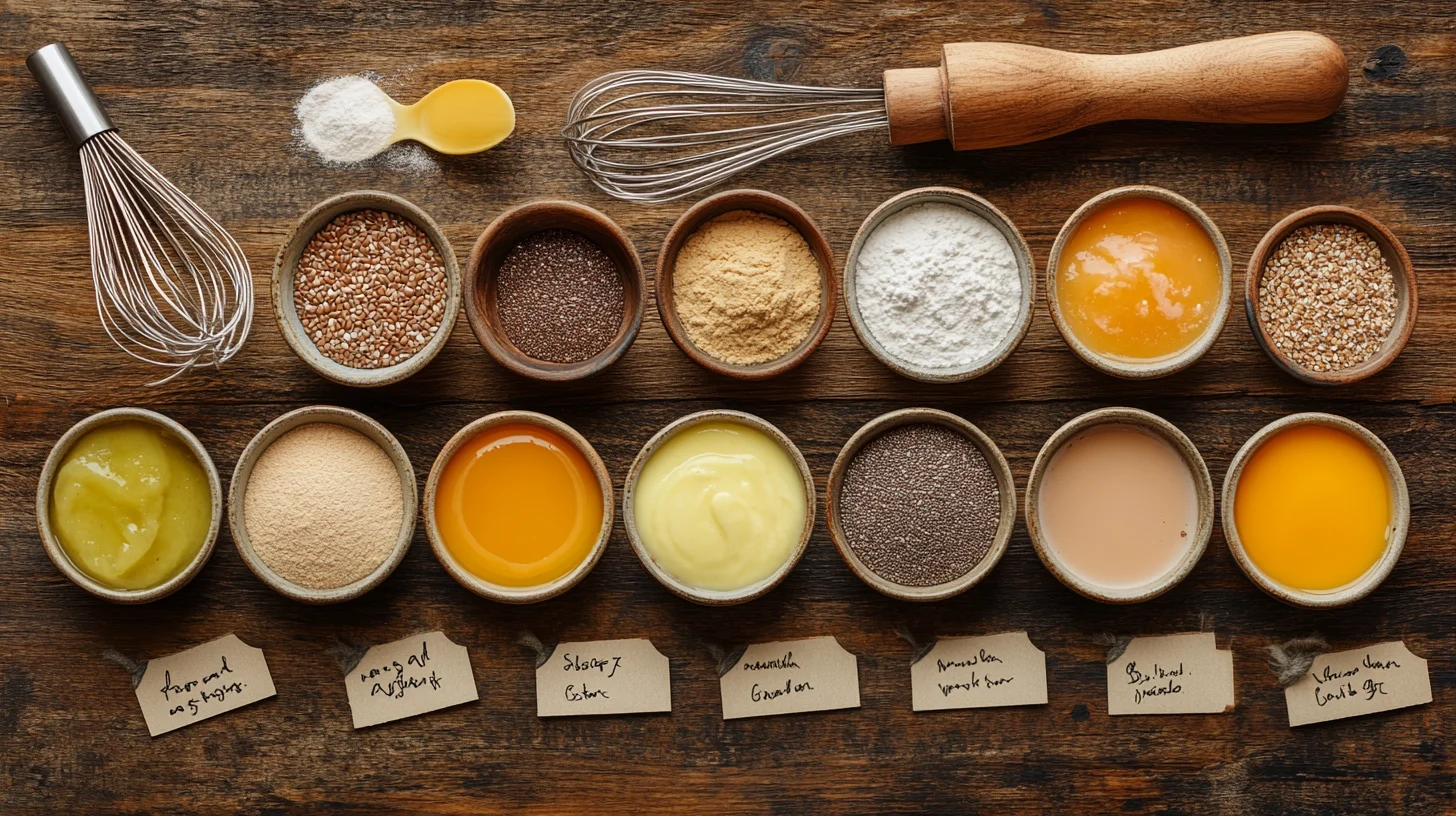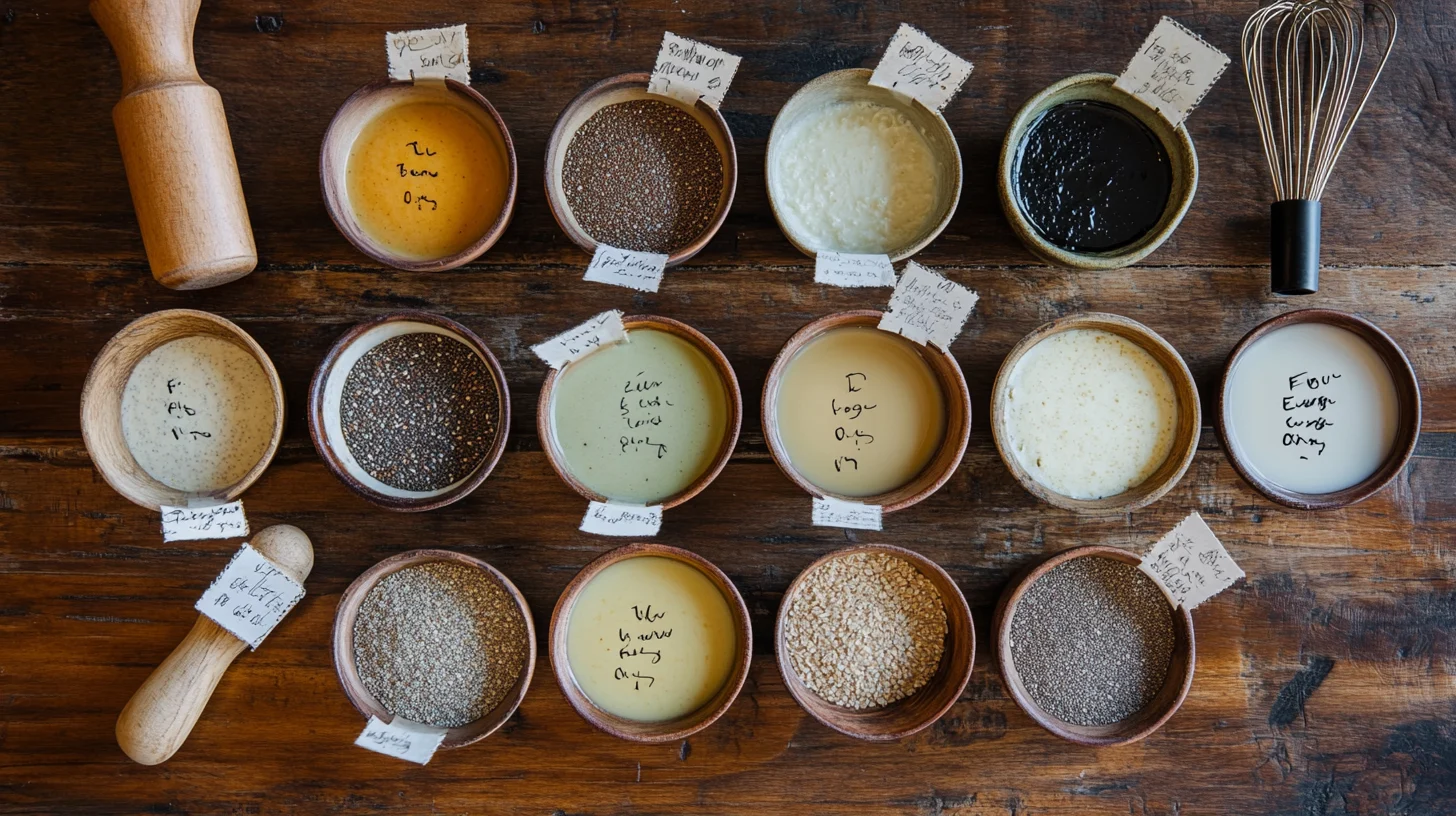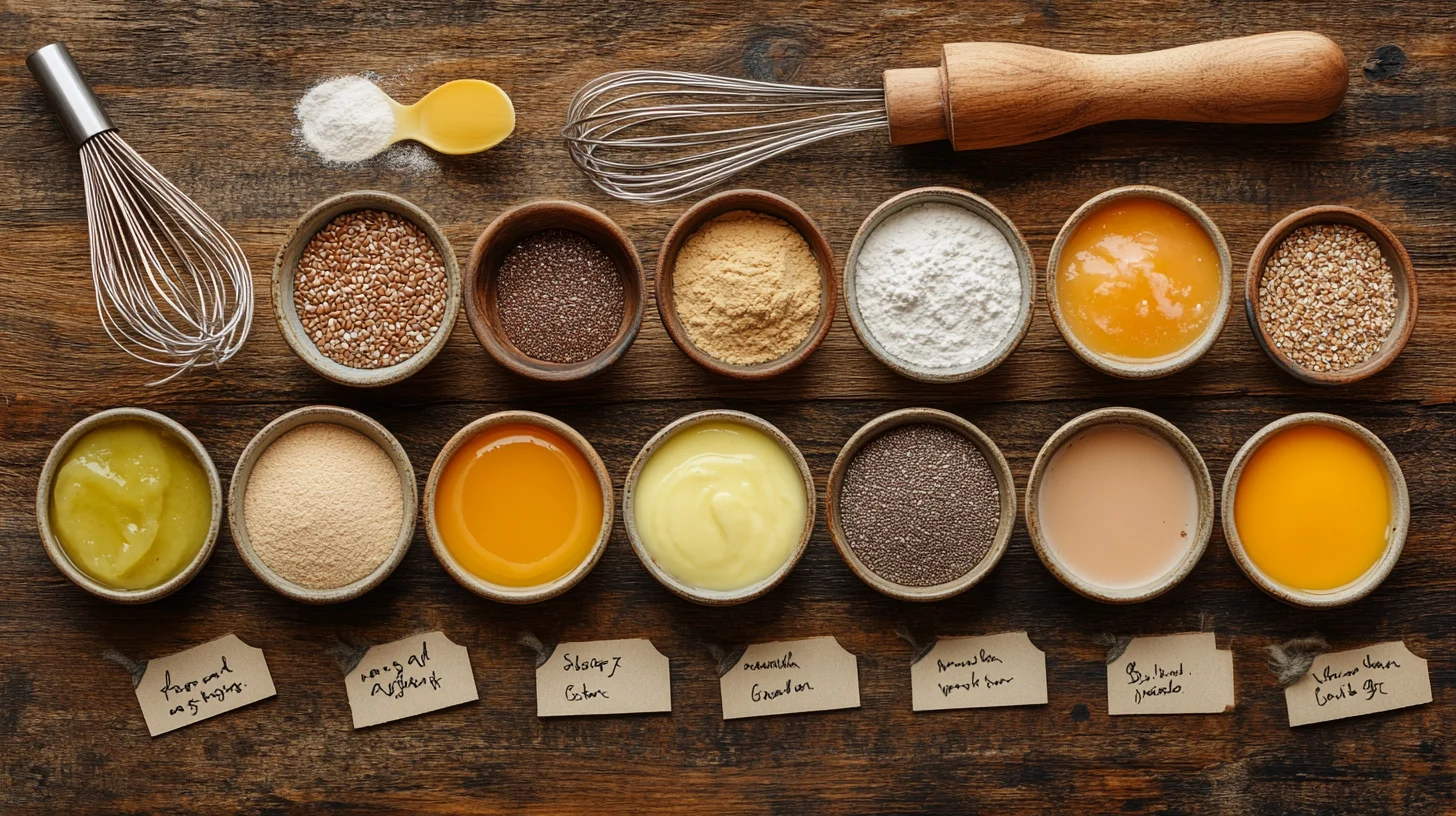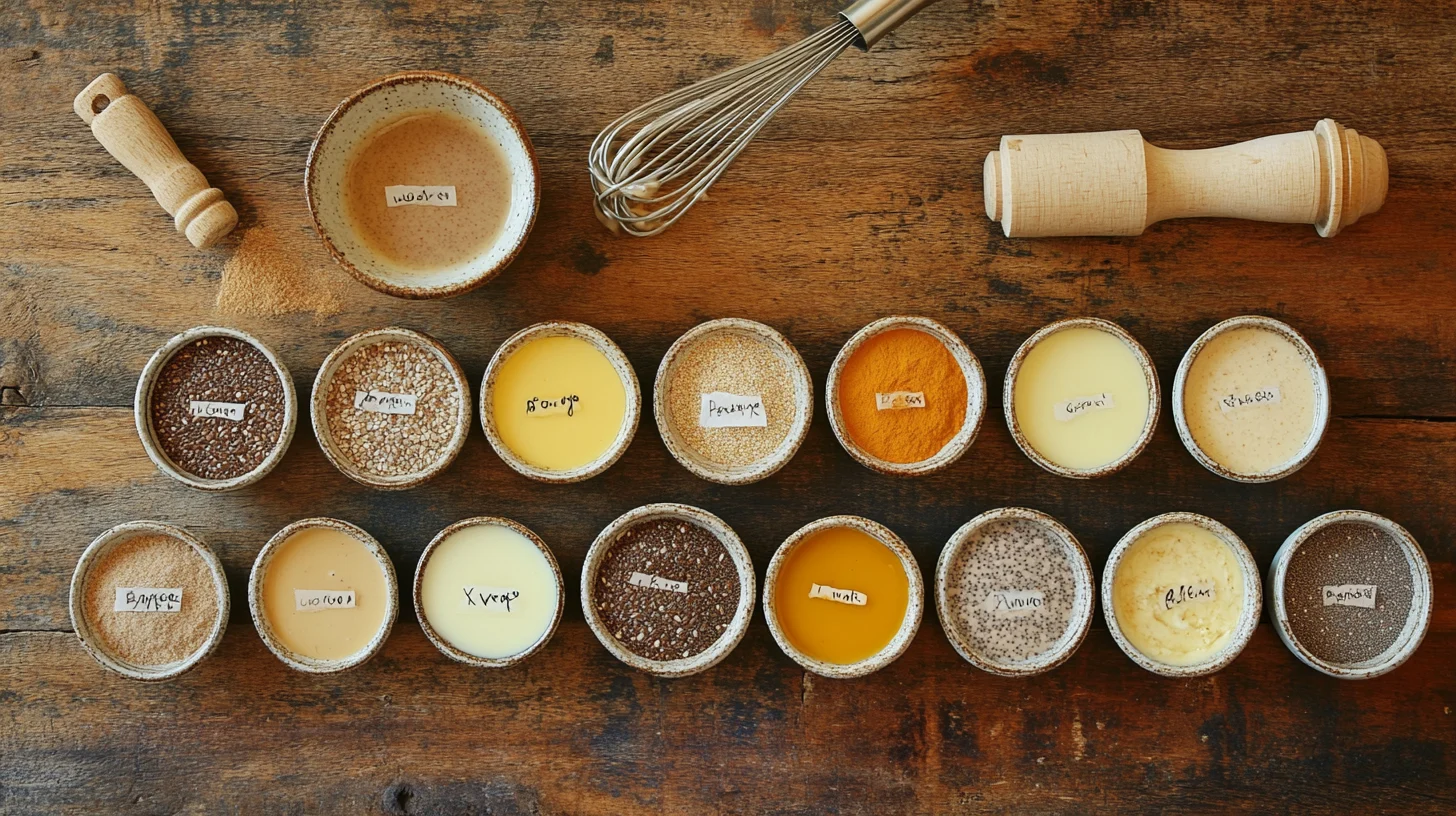Introduction to Vegan Egg Substitutes
Eggs are a staple ingredient in many baking recipes, playing critical roles in binding, leavening, and adding moisture. However, for those following a plant-based lifestyle, vegan egg substitutes offer the perfect solution. With the right alternatives, you can still achieve fluffy cakes, chewy cookies, and moist brownies without using animal products.
In this guide on Vegan Egg Substitutes: Perfect Alternatives for Baking Recipes, we will explore a variety of plant-based options that seamlessly replace eggs in baked goods. These substitutes are easy to find, nutritious, and work effectively in almost any recipe. Whether you are vegan, have an egg allergy, or simply want to try healthier baking alternatives, these options will keep your creations delicious and satisfying.
By understanding how to use each substitute correctly, you can confidently bake without eggs while maintaining excellent texture and flavor.
For a nutritious plant-based snack, check out this Protein Cookie Recipe, a perfect pairing for vegan baking enthusiasts.
Why Use Vegan Egg Substitutes in Baking?
Switching to vegan egg substitutes in baking has become increasingly popular, and for good reason. Not only do these alternatives support a plant-based lifestyle, but they also offer several other benefits that can appeal to all types of bakers.
Reasons to Use Vegan Egg Substitutes:
- Dietary Restrictions: Perfect for those with egg allergies, intolerances, or dietary preferences like veganism.
- Healthier Option: Vegan substitutes are often lower in cholesterol and saturated fats compared to traditional eggs.
- Environmentally Friendly: Plant-based alternatives reduce the environmental impact associated with egg production.
- Cost-Effective: Ingredients like flaxseed, chia seeds, and applesauce are affordable and easy to find.
By incorporating Vegan Egg Substitutes: Perfect Alternatives for Baking Recipes into your routine, you can create baked goods that align with your dietary needs while being healthier and eco-friendly.
Looking for an easy recipe with pantry staples? Explore the Hotcake Mix Recipe to add variety to your breakfast options.

How Eggs Function in Baking Recipes
Before diving into substitutes, it’s important to understand how eggs function in baking recipes. Eggs serve multiple purposes, so the best substitute will depend on the specific role eggs play in your recipe.
Key Roles of Eggs in Baking:
- Binding: Eggs help hold ingredients together, creating structure in baked goods.
- Leavening: Eggs trap air during mixing, which helps cakes, muffins, and bread rise.
- Moisture: Eggs add moisture, keeping baked goods soft and tender.
- Flavor and Richness: They enhance flavor and contribute to a rich texture.
Replacing eggs requires substitutes that mimic these functions. For instance, flaxseed or chia eggs work well for binding, while aquafaba and baking soda can help with leavening. By choosing the right substitute, you can ensure your baked goods maintain their structure, rise properly, and taste delicious.
Flaxseed Eggs: A Nutritious Binding Solution
Flaxseed eggs are one of the most popular vegan egg substitutes for baking. Rich in fiber, omega-3 fatty acids, and other nutrients, flaxseeds provide a healthy and functional alternative to eggs. When mixed with water, ground flaxseeds form a thick, gel-like consistency that works perfectly as a binder.
How to Make a Flaxseed Egg:
- Combine 1 tablespoon of ground flaxseed with 3 tablespoons of water.
- Stir and let it sit for 5-10 minutes until it thickens.
- Use this mixture to replace one egg in baking recipes.
Best Uses for Flaxseed Eggs:
- Cookies, brownies, and quick breads.
- Recipes where binding is essential.
Benefits of Flaxseed Eggs:
- Nutrient-Rich: High in omega-3s and fiber.
- Neutral Flavor: Does not overpower other ingredients.
- Easy to Make: Requires only two ingredients.
By including flaxseed eggs in your Vegan Egg Substitutes: Perfect Alternatives for Baking Recipes, you’ll achieve excellent structure and texture while boosting nutrition.
Chia Seeds: A Gel-Like Egg Replacement
Chia seeds are another excellent vegan egg substitute for baking, offering similar properties to flaxseed eggs. When mixed with water, chia seeds absorb liquid and form a gel-like texture that acts as a natural binder. Chia seeds are also packed with fiber, protein, and healthy fats, making them a nutritious addition to baked goods.
How to Make a Chia Egg:
- Mix 1 tablespoon of chia seeds with 3 tablespoons of water.
- Let the mixture sit for 10-15 minutes until it thickens.
- Use it to replace one egg in baking recipes.
Best Uses for Chia Eggs:
- Cakes, muffins, and pancakes.
- Recipes requiring moisture and structure.
Benefits of Chia Eggs:
- Nutrient-Dense: Loaded with omega-3 fatty acids and antioxidants.
- Versatile: Works in both sweet and savory recipes.
- Adds Texture: Provides a slight crunch if left unground.
Chia eggs are a versatile and reliable option in Vegan Egg Substitutes: Perfect Alternatives for Baking Recipes, delivering excellent binding and moisture retention.

Aquafaba: The Magic Liquid from Chickpeas
Aquafaba, the liquid leftover from canned chickpeas, has revolutionized vegan baking. Its unique properties allow it to mimic egg whites, making it ideal for recipes that require leavening or structure. This “magic liquid” whips into peaks just like traditional egg whites, offering incredible versatility in baking.
How to Use Aquafaba:
- Use 3 tablespoons of aquafaba to replace one egg.
- For whipped egg whites, whisk aquafaba until soft peaks form.
Best Uses for Aquafaba:
- Meringues, macarons, and pavlovas.
- Cakes, brownies, and mousses requiring lightness and lift.
Benefits of Aquafaba:
- Highly Versatile: Works as a direct substitute for egg whites.
- Low-Calorie: Virtually fat-free and low in calories.
- Neutral Flavor: Does not alter the taste of baked goods.
Incorporating aquafaba into your Vegan Egg Substitutes: Perfect Alternatives for Baking Recipes allows you to achieve the perfect lift and texture for light, fluffy baked goods.
Applesauce: A Sweet and Moist Alternative
Applesauce is a simple and readily available vegan egg substitute that adds moisture to baked goods. It works particularly well in recipes where eggs are primarily used for their moisture-retaining properties. Additionally, applesauce lends a subtle sweetness to the final product, making it ideal for desserts.
How to Use Applesauce:
- Replace one egg with ¼ cup of unsweetened applesauce.
- Reduce added sugar slightly to balance the natural sweetness.
Best Uses for Applesauce:
- Cakes, muffins, and brownies.
- Recipes where moisture is key to achieving a soft texture.
Benefits of Applesauce:
- Adds Moisture: Prevents baked goods from drying out.
- Low in Fat: A healthy alternative to eggs and oil.
- Naturally Sweet: Enhances the flavor without overpowering it.
By using applesauce as part of Vegan Egg Substitutes: Perfect Alternatives for Baking Recipes, you can create soft, tender baked goods that are both delicious and egg-free.
Banana Puree: Natural Sweetness and Binding
Banana puree is an excellent vegan egg substitute that offers both natural sweetness and effective binding properties. It works especially well in recipes that require moisture and a hint of fruity flavor, such as cakes, muffins, and pancakes.
How to Use Banana Puree:
- Replace one egg with ¼ cup of mashed ripe banana.
- Ensure the banana is smooth and lump-free for the best results.
Best Uses for Banana Puree:
- Banana bread, muffins, and brownies.
- Dense cakes or recipes where the banana flavor complements other ingredients.
Benefits of Banana Puree:
- Natural Sweetness: Reduces the need for added sugar.
- Moisture Retention: Keeps baked goods soft and tender.
- Easy to Find: Ripe bananas are affordable and readily available.
While banana puree works well in many recipes, it does impart a subtle banana flavor. For desserts that require natural sweetness and binding, it’s a top choice in Vegan Egg Substitutes: Perfect Alternatives for Baking Recipes.

Silken Tofu: Ideal for Dense and Rich Bakes
Silken tofu is a versatile, protein-rich egg substitute that excels in recipes requiring density and richness. It is perfect for brownies, cheesecakes, and dense cakes where moisture retention is key. With its smooth and creamy texture, silken tofu seamlessly replaces eggs while adding a nutritional boost.
How to Use Silken Tofu:
- Blend ¼ cup of silken tofu until smooth to replace one egg.
- Incorporate the mixture evenly into your batter.
Best Uses for Silken Tofu:
- Brownies, pound cakes, and vegan cheesecakes.
- Recipes requiring moisture and a creamy texture.
Benefits of Silken Tofu:
- Protein Boost: Adds plant-based protein to baked goods.
- Neutral Flavor: Does not alter the recipe’s taste.
- Creamy Texture: Creates a soft and rich consistency.
Silken tofu’s ability to add density and creaminess makes it a standout choice in Vegan Egg Substitutes: Perfect Alternatives for Baking Recipes. It ensures your baked goods are moist, tender, and full of flavor.
Baking Soda and Vinegar: The Perfect Leavening Duo
Baking soda and vinegar are a powerful combination for replacing eggs in recipes that need leavening. Together, they produce a chemical reaction that releases carbon dioxide, helping baked goods rise and achieve a light, fluffy texture.
How to Use Baking Soda and Vinegar:
- Mix 1 tablespoon of baking soda with 1 tablespoon of vinegar to replace one egg.
- Add the mixture to the batter quickly to capture the leavening effect.
Best Uses for Baking Soda and Vinegar:
- Cakes, cupcakes, and muffins.
- Recipes where rising and fluffiness are essential.
Benefits of Baking Soda and Vinegar:
- Effective Leavening: Adds airiness and lift to baked goods.
- Neutral Flavor: Does not leave any aftertaste when used correctly.
- Affordable and Accessible: Both ingredients are inexpensive and easy to find.
For recipes that rely on rising, this duo is a game-changer in Vegan Egg Substitutes: Perfect Alternatives for Baking Recipes, delivering light and fluffy results without the need for eggs.

Commercial Vegan Egg Replacers: Convenient and Reliable
For those seeking a hassle-free solution, commercial vegan egg replacers are the most convenient option. These products are specifically formulated to mimic the properties of eggs, making them reliable for both binding and leavening.
Popular Commercial Vegan Egg Replacers:
- JUST Egg: A liquid egg substitute made from mung beans.
- Bob’s Red Mill Egg Replacer: A versatile powder-based substitute suitable for most recipes.
- Ener-G Egg Replacer: A gluten-free and starch-based option.
- Follow Your Heart VeganEgg: Provides excellent moisture and binding.
Benefits of Commercial Replacers:
- Consistency: Delivers reliable results every time.
- Versatile: Works in a wide range of baking recipes.
- Easy to Use: Requires minimal preparation.
These substitutes are ideal for beginners or those who want to avoid guesswork. As part of Vegan Egg Substitutes: Perfect Alternatives for Baking Recipes, commercial egg replacers offer convenience without sacrificing quality.
Best Vegan Egg Substitutes for Cakes and Cupcakes
Cakes and cupcakes rely on eggs for structure, moisture, and leavening, so selecting the right vegan egg substitute is crucial. The choice will depend on the texture and flavor you’re aiming for.
Top Vegan Egg Substitutes for Cakes and Cupcakes:
- Aquafaba: Perfect for light and airy cakes, as it mimics egg whites beautifully.
- Flaxseed Eggs: Excellent for dense, moist cakes that require binding.
- Baking Soda and Vinegar: Adds leavening for fluffy cakes and cupcakes.
- Silken Tofu: Ideal for rich and creamy cake textures, such as pound cakes.
- Banana Puree: Adds moisture and a subtle sweetness, perfect for banana cakes or muffins.
By understanding which substitute works best for your needs, you can ensure your baked goods rise perfectly and have the right texture. With Vegan Egg Substitutes: Perfect Alternatives for Baking Recipes, achieving vegan-friendly cakes and cupcakes is easier than ever.
How to Choose the Right Vegan Egg Substitute for Your Recipe
Choosing the right vegan egg substitute depends on the specific role of eggs in your recipe. Whether you need binding, moisture, or leavening, selecting the appropriate substitute is key to achieving success in baking.
Consider These Factors:
- Binding Needs: Use flaxseed eggs, chia seeds, or commercial egg replacers for structure.
- Leavening: Baking soda with vinegar or aquafaba works best for light and fluffy baked goods.
- Moisture Retention: Opt for silken tofu, banana puree, or applesauce to keep recipes moist.
- Flavor Profile: Neutral substitutes like silken tofu and aquafaba are best for delicate flavors, while banana and applesauce add sweetness.
Understanding your recipe’s requirements will help you select the perfect alternative. With Vegan Egg Substitutes: Perfect Alternatives for Baking Recipes, you can confidently adapt any recipe without compromising on quality.
Final Thoughts: Mastering Vegan Baking Without Eggs
Mastering egg-free baking is entirely achievable with the right substitutes. From flaxseed eggs to aquafaba and commercial egg replacers, each alternative brings its unique benefits to the table. Whether you’re baking dense brownies, fluffy cakes, or moist muffins, there is a vegan egg substitute that will deliver perfect results.
By understanding how each substitute works and when to use it, you can confidently adapt your favorite recipes into plant-based versions. The Vegan Egg Substitutes: Perfect Alternatives for Baking Recipes guide ensures you have all the tools to create delicious, egg-free baked goods without sacrificing flavor, texture, or structure.
Embrace these alternatives, experiment with your recipes, and enjoy the satisfaction of baking vegan treats that everyone will love.
